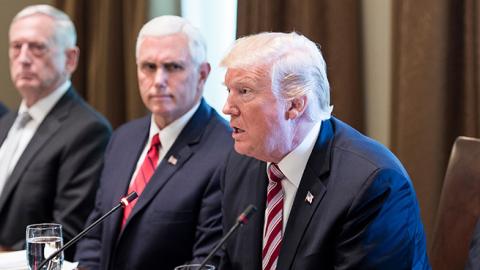With the Oct. 15 deadline for certifying to Congress that Iran is in compliance with the nuclear deal, officially known as the Joint Comprehensive Plan of Action, Donald Trump is set to deliver a speech next week regarding his intentions. According to a report this afternoon from Adam Kredo at the Washington Free Beacon, Trump will decline to certify. That will give Congress 60 days to decide whether or not to reimpose the nuclear-related sanctions on Iran that the Obama administration lifted in exchange for limits on the country’s nuclear program. Should Congress reinstate sanctions, the Obama administration’s signature foreign policy initiative is almost surely doomed.
It appears that Trump faced strong opposition, even from his own Cabinet officials. Press reports Tuesday described a last-ditch effort by Secretary of State Rex Tillerson to convince the president to certify an agreement the president has called one of the “worst and most one-sided transactions.” Trump’s two top defense officials, Defense Secretary James Mattis and Chairman of the Joint Chiefs of Staff Gen. Joseph Dunford, also expressed support for the deal Tuesday in testimony before the Senate Armed Services Committee. Asked by Sen. Angus King if he believed it was in the U.S. national interest to stay in the deal, Mattis replied “yes, Senator, I do.”
Apparently, Trump disagrees. So do two of the president’s top allies in the Iran fight, Sens. Ted Cruz and Tom Cotton. "Even if [the Iranians] were complying with it,” Cotton said, “even if it was fully verifiable they were complying with it, which it's not and which they aren't, it is still not in our viable national security interests because it does not block Iran's path to a bomb.”
As Cruz explained, “Iran's continued refusal to allow IAEA access to military sites—a clear requirement of the terms of the deal—renders the JCPOA utterly ineffective, and, even worse, a sham that only facilitates Iran's acquiring nuclear weapons.” Cruz continued: "This absence of any meaningful verification is yet another reason to vitiate this foolhardy agreement."
The 2015 Iran Nuclear Agreement Review Act stipulates that the president must certify in a letter to congress every ninety days that the Iran deal has met four conditions specified in the law. Declining to certify does not itself dismantle the deal, but it is probably a necessary first step because it's a basic acknowledgment the deal needs to be dismantled. Within sixty days, congress can re-impose sanctions on an expedited basis with majority votes . The administration would also be set up to further unravel the deal by going to the U.N. to reinstate multilateral sanctions.
In the meantime, the Trump administration could proceed with its government-wide review of Iran policy and formulate a comprehensive strategy. It will anyway, but after decertification it will no longer be constrained by the pretense the deal is worth preserving. After all, the purpose of the Iran deal, as UN ambassador Nikki Haley explained, was to subordinate “everything in our relationship with the Iranian regime … to the preservation of the agreement.”
Obama saw the Iran deal not simply, or even primarily, as an arms agreement. As I argued in a study for the Friends of Israel Initiative, chaired by the former Spanish prime minister José Maria Aznar, “the JCPOA served as the hinge for a larger geopolitical maneuver.”* The purpose was to recalibrate American interests in a region where the United States, Obama believed, had no choice but to minimize its footprint. His strategy was to downgrade traditional American allies like Israel and Saudi Arabia, and upgrade a longstanding adversarial regime in Tehran. Thus “realignment with Iran shaped all of the major foreign policy issues of the Obama presidency, including the fraying of the bilateral relationship with Israel, the withdrawal from Iraq, the relationship with Russia, and the management of the Syrian conflict.”
The Obama White House feared that any friction with the Iranians was likely to give them an opening to leave negotiations over the nuclear deal. Thus it turned a blind eye even as Iran took American hostages, detained American sailors in the Persian Gulf The Obama administration congratulated itself on resolving these crises through the diplomatic channels afforded by the habit of negotiations over the JCPOA. In fact the opposite was true: The promise of a deal with Iran that would serve as the path to realignment deterred Obama from protecting American citizens, interests, and allies.
It was built to deter future policymakers as well. The deal was designed, I explained, “to survive a new administration by creating huge and powerful constituencies with a stake in preserving the deal, both at home, inside and outside government, and abroad, in European and Asian parliaments as well as corporate boardrooms on those continents. This is why actions taken to dismantle the deal have met with strong opposition, even in the administration itself.”
Insofar as the JCPOA was meant to tie the hands of the next administration, it hasn’t. But if the Trump White House intends to dismantle what CIA director Mike Pompeo called a “disastrous deal with the world’s largest state sponsor of terrorism,” there’s still much work ahead.
*Correction: The article originally described José Maria Aznar as the former Spanish president.



















